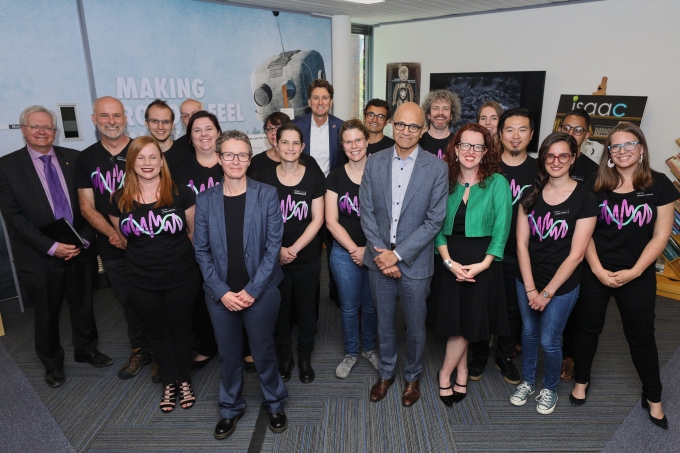The next-generation of engineers who will lay the foundations of a world built on artificial intelligence have had a rare chance to learn from one of the world’s best - Global CEO of Microsoft Satya Nadella.
As part of a whirlwind tour of Australia in late November, Mr Nadella made time to meet with students from The Australian National University’s 3A Institute, where he and his Australian colleagues provided key insights and lessons from their experience at the frontline of AI.
The 3A Institute (3Ai) in the ANU College of Engineering and Computer Science has embarked on an ambitious mission to establish a new branch of engineering to help take AI safely to scale.
This includes a dedicated master’s program being taught for the first time in 2019 that brings students in to co-pilot this emerging field, equipping them with the skills to become its first practitioners.
Artificial intelligence-enabled technologies open opportunities for the economy and society, both for Australia and the world.
The importance of devoting a new field to the responsible use of AI, with the 3A Institute at the helm, was highlighted during Mr Nadella’s visit.
Mr Nadella noted that the diverse makeup of the student cohort is the “best defence” to the issue of proper control and oversight of next-gen technical systems.
According to Institute Director, Distinguished Professor Genevieve Bell, it is critical to have a rich cohort which develops into a genuine community of people who can learn from each other.
The students had the opportunity to showcase their learning and work to the Microsoft delegation.
A project that featured on the day was ‘Cognitive Cubes’, a game-based education platform that helps people to learn in the classroom, while learning about people.
Mr Nadella was enthusiastic about the potential of deep personalisation of learning in the classroom.
3Ai student Olivia Reeves says her work is an example of how AI can augment and assist.
“You need to look at the system holistically,” she said.
“The key thing is this technology is a way to improve things that you are already doing - if things were fundamentally flawed then it’s not going to help.”
Professor Bell hopes the body of knowledge and skills that emerge from the master’s program will steer new conversations about the interaction between the digital and physical worlds.
“My suspicion is the cohort this year are going to end up working alongside computer scientists and more traditional engineers, but also alongside product teams and to some degree acting as a translator between the real world and AI systems,” she said.
“It turns out being ready to inhabit this world of cyber-physical systems means asking a whole set of questions that most organisations don’t yet know how to do.”
The 3A Institute will welcome the next cohort of master’s students to navigate these questions and more, when they start in February 2020.
Microsoft has agreed to provide financial support for educational content creation at the Institute. ANU Vice-Chancellor Professor Brian Schmidt has announced the University will match Microsoft’s contribution.

